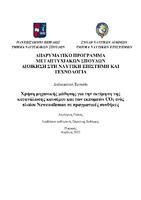| dc.contributor.advisor | Παριώτης, Ευθύμιος | |
| dc.contributor.author | Γκίκας, Δημήτριος | |
| dc.date.accessioned | 2025-04-16T09:39:49Z | |
| dc.date.available | 2025-04-16T09:39:49Z | |
| dc.date.issued | 2025-04-15 | |
| dc.identifier.uri | https://dione.lib.unipi.gr/xmlui/handle/unipi/17673 | |
| dc.description.abstract | Στην παρούσα διπλωματική εργασία έγινε χρήση μίας εκ των τεχνικών μηχανικής μάθησης της Random Forest Regression η οποία θεωρήθηκε ως η καλύτερη μέθοδος για τα διαθέσιμα δεδομένα, αξιοποιώντας μετρήσεις από ιστορικά δεδομένα που αφορούν ένα πλοίο τύπου Newcastlemax, για την ανάπτυξη μοντέλου εκτίμησης κατανάλωσης καυσίμου κυρίας μηχανής και εκπομπών CO2 υπό πραγματικές συνθήκες πλεύσης. Συγκεκριμένα χρησιμοποιήθηκαν δεδομένα για 14 ταξίδια σε διάφορες καταστάσεις φόρτωσης και καταστάσεις θάλασσας. Εν κατακλείδι δημιουργήθηκαν μοντέλα σε περιβάλλον python που εκτιμούν την κατανάλωση και κατ’ επέκταση τις εκπομπές CO2 και με τα μέγιστα και ελάχιστα δυνατά δεδομένα, δηλαδή δεδομένα που θα μπορούσαν να αντληθούν από μια βάση δεδομένων (weather provider). | el |
| dc.format.extent | 95 | el |
| dc.language.iso | el | el |
| dc.publisher | Πανεπιστήμιο Πειραιώς | el |
| dc.rights | Αναφορά Δημιουργού-Μη Εμπορική Χρήση-Όχι Παράγωγα Έργα 3.0 Ελλάδα | * |
| dc.rights.uri | http://creativecommons.org/licenses/by-nc-nd/3.0/gr/ | * |
| dc.title | Χρήση μηχανικής μάθησης για την εκτίμηση της κατανάλωσης καυσίμου και των εκπομπών CO2 ενός πλοίου Newcastlemax σε πραγματικές συνθήκες | el |
| dc.type | Master Thesis | el |
| dc.contributor.department | Σχολή Ναυτιλίας και Βιομηχανίας. Τμήμα Ναυτιλιακών Σπουδών | el |
| dc.description.abstractEN | In this thesis, Random Forest Regression, a machine learning technique, was utilised as the optimal method for the available data. This approach involved the utilisation of measurements from historical data concerning a Newcastlemax type vessel to develop a model for the estimation of main engine fuel consumption and CO2 emissions under realistic sailing conditions. In particular, the data were used for 14 voyages in different loading and sea states. In conclusion, using a Python environment, models were created to estimate consumption and hence CO2 emissions using both maximum and minimum possible data, i.e. data that could be obtained from a database (weather provider). | el |
| dc.corporate.name | Σχολή Ναυτικών Δοκίμων | el |
| dc.contributor.master | ΔΠΜΣ στη Διοίκηση στη Ναυτική Επιστήμη και Τεχνολογία | el |
| dc.subject.keyword | Machine learning | el |
| dc.subject.keyword | Random forest regression | el |
| dc.subject.keyword | Fuel consumption | el |
| dc.subject.keyword | CII | el |
| dc.subject.keyword | Python | el |
| dc.date.defense | 2025-04-04 | |



